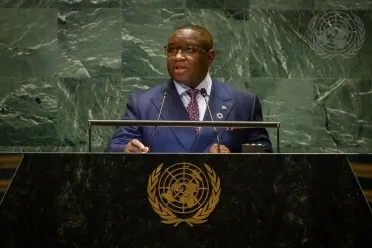Statement
Statement summary
JULIUS MAADA BIO, President of Sierra Leone, recalling his country’s decade‑long, brutal civil war, said that his country’s hard-won peace today is born out of genuine dialogue and vigilance inside of the country and support from organizations like the UN and the Economic Community of West African States (ECOWAS). The country’s journey to peace informs its work on the Security Council, promoting respect for international law and the Charter, the protection of civilians and the importance of dialogue. The international community’s commitment to these principles matters now more than ever with conflicts raging in the Middle East, Africa, Asia and Eastern Europe. Calling for an immediate ceasefire in Gaza and the Middle East, Sudan, eastern Democratic Republic of Congo and Ukraine, he said that, not to be achieved in isolation, peace “requires the inclusive political process, economic development and respect for human rights”. “For the millions of civilians trapped in armed conflicts, words of condemnation are not enough,” he said, hailing leaders in the Sahel and West Africa working to respond to security challenges such as terrorism while calling on the international community to support African-led peace initiatives and for the United Nations to actively address the root causes of those conflicts.
“We need to build bridges, and this requires the international community’s commitment to working with the regions to implement dialogue-based, region-led, and region-owned solutions,” he said, adding that his country’s current mandate on the Security Council has highlighted the need for urgent reform as its current makeup does not accurately reflect the world today. The Council “has been stuck in time” and “Africa remains the unquestionable victim”. Further, in its current, unchanged form, the Council’s performance and legitimacy are questionable, he said. In that same vein, recalling an open debate held under his country’s presidency, it was clear that the historical injustice committed against Africa must be rectified and that the continent must be prioritized in Council reform. “The legacy of colonialism, economic exploitation, and political marginalization has left deep scars on the African continent, thereby affecting its development, stability and influence in international affairs.” Equitable representation of the continent will better equip the UN to tackle global challenges and foster a more just world, and “Africa therefore demands no less than two permanent seats with all the rights and privileges of the permanent members, including the right to veto”, as well as two non-permanent seats, he said. “Africa’s voice must be heard and its demands for justice and equity must be met now.”
In the spirit of the Summit of the Future, he spotlighted Sierra Leone’s Medium-Term National Development Plan 2024-2030 laying out a framework delivering socioeconomic development aligned with the SDGs. The country will also invest in human capital development with investments in education, health care and agriculture. Among other positive developments such as the “Free Quality Education Programme” and advancements in gender equality, a bill prohibiting child marriage was signed into law in 2024 following the 2023 “Gender Equality and Women’s Empowerment Act”, both of which ensure women and girls’ national aspiration for a more inclusive society. “I remain steadfast in my commitment to ensuring that every girl and woman lives in a safe environment, with ample opportunities to realize their full potential.” To that end, Sierra Leone will lead efforts on a conference to conclude a legally binding instrument on access to justice for sexual violence survivors, the “Freetown Treaty”.
“Leaving no one behind” means ensuring ending global inequalities, he stressed, adding that the debt crisis and a lack of capital flow combined with impacts of climate change, conflicts and political instability will prevent developing countries from achieving the SDGs. Sierra Leone therefore endorses the “Nairobi IDA Communiqué”, increasing development support in Africa through affordable, concessional finance facilitating economic and health-care development without becoming buried in debt. Finally, noting that the end of the Second World War united leaders and urged them to cooperate, he recited an African proverb: “Our two hands do not wash themselves — they wash one another,” and called on the Assembly for greater cooperation. “Divisions and unhealthy competition will only lead to humanity’s destruction,” he said, stressing: “We must ensure unity in diversity, where the rights of the weak and the minority are protected.”
Full statement
Read the full statement, in PDF format.
Photo

Previous sessions
Access the statements from previous sessions.
